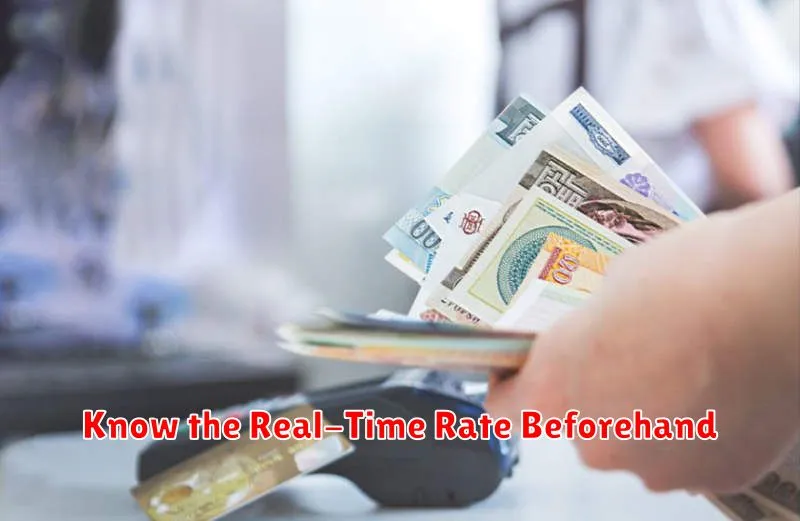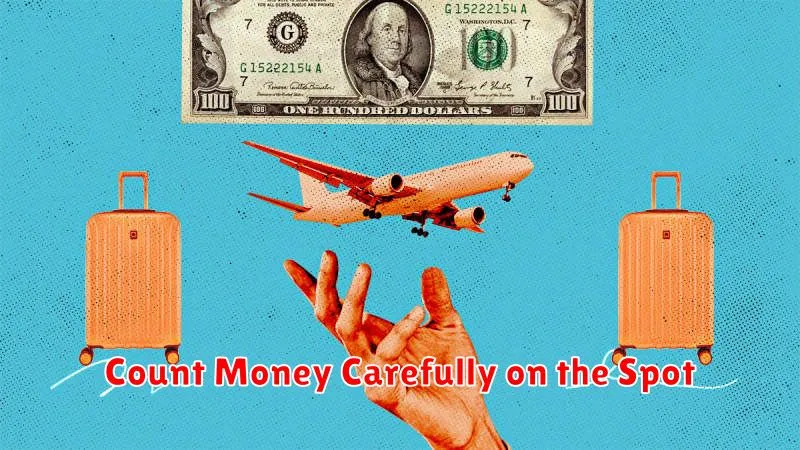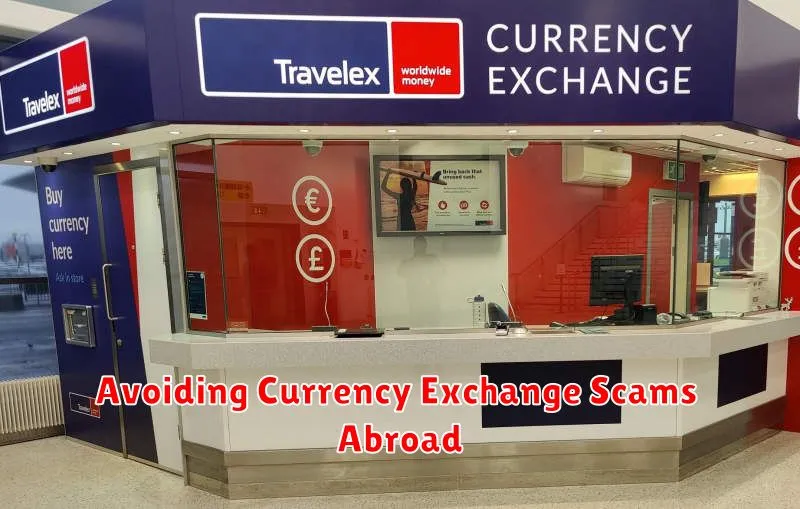Traveling abroad offers incredible opportunities for exploration and cultural immersion, but navigating foreign currency exchange can be a minefield. Currency exchange scams are, unfortunately, a common occurrence, targeting unsuspecting travelers. Understanding how these scams operate and taking proactive steps to avoid them is crucial for protecting your finances and ensuring a smooth travel experience. This article will provide you with essential information on how to recognize and avoid currency exchange scams abroad, empowering you to make informed decisions and keep your money safe while you travel internationally.
From deceptive exchange rates and hidden fees to counterfeit currency and sleight-of-hand tricks, currency exchange scams can take various forms. Whether you’re a seasoned globetrotter or planning your first international trip, being aware of the common tactics employed by scammers is paramount. We will explore practical strategies for securing the best currency exchange rates, identifying reputable money exchange providers, and safeguarding your finances throughout your journey. By staying informed and vigilant, you can confidently navigate the world of foreign currency exchange and avoid falling victim to these fraudulent schemes.
Understanding Common Exchange Scams
Falling victim to a currency exchange scam can quickly derail your trip. Awareness is your best defense. Familiarize yourself with these common tactics to avoid becoming a target.
The “too good to be true” rate is a classic lure. Scammers advertise incredibly favorable exchange rates to draw you in, then employ various methods to shortchange you.
Sleight of hand is a common tactic used during the exchange process. The scammer might quickly switch bills, count the money incorrectly, or use confusing denominations to distract you.
Hidden fees are another way scammers take advantage of unsuspecting travelers. Be sure to ask about all fees upfront and carefully review any paperwork before agreeing to the exchange.
Counterfeit currency is a serious concern. Always inspect the banknotes you receive and be wary of exchanges happening in unofficial locations.
Distraction scams often involve an accomplice creating a diversion while the scammer manipulates the exchange. Stay alert and focused during the transaction.
Exchange at Official Locations Only
One of the most effective ways to avoid currency exchange scams is to exchange your money only at official locations. These include banks, reputable exchange bureaus, and hotels. Avoid exchanging money at unofficial locations, such as with street vendors or in unregulated shops, as these are prime locations for scams.
Banks typically offer the most competitive exchange rates, although they may charge a small fee. Reputable exchange bureaus are also a good option, especially if you need to exchange currency outside of banking hours. Hotels often offer currency exchange services for their guests, but their rates may be less favorable than banks or exchange bureaus.
By sticking to official exchange locations, you significantly reduce your risk of being scammed. These establishments are regulated and are much more likely to provide fair exchange rates and transparent fees.
Know the Real-Time Rate Beforehand

One of the most effective ways to avoid currency exchange scams is to be aware of the real-time exchange rate. Check the current mid-market rate before you travel. This rate, also known as the interbank rate, is the midpoint between the buy and sell rates used by banks and currency traders. It’s the fairest exchange rate you can expect. Several reputable financial websites and apps offer this information readily.
Knowing the current rate allows you to identify exorbitant exchange rates offered by money changers. While you won’t get the exact mid-market rate, having this knowledge gives you a baseline for negotiation and helps you avoid significantly unfavorable deals. Be wary of offers that seem too good to be true, as these are often associated with hidden fees or deceptive practices.
Keep track of rate fluctuations, especially for less common currencies. Exchange rates can shift due to various economic and political factors. Staying updated helps you anticipate potential changes and make informed decisions regarding when and where to exchange your currency.
Count Money Carefully on the Spot

Once you receive your foreign currency, do not leave the counter until you’ve thoroughly counted it. This applies whether you’re at a bank, exchange bureau, or airport kiosk. Discrepancies are much easier to address immediately.
Double-check the exchange rate displayed and ensure it matches what you were quoted. If you’re unsure, ask for clarification. Some disreputable businesses might try to use a less favorable rate once you’ve handed over your money.
Be particularly vigilant when dealing with large sums. Organize the bills into manageable stacks to facilitate counting and verify the authenticity of the banknotes. Look for security features like watermarks and holographic strips.
Avoid Street Exchangers
Street exchangers often offer seemingly attractive exchange rates. However, they operate outside regulated financial systems, increasing the risk of scams. These can include bait-and-switch tactics where the initially offered rate is not the rate you ultimately receive. They might also use slight-of-hand tricks or counterfeit currency.
Safety is another concern. Conducting transactions in public, often with large sums of cash, makes you a potential target for theft. Street exchangers are also not subject to the same regulations as banks and official exchange bureaus, making it nearly impossible to recourse if you are defrauded.
Stick to authorized currency exchange providers like banks, hotels, or airport exchange bureaus, even if the rates might seem slightly less favorable. The added security and peace of mind are worth the small potential difference in cost.
Use Credit Cards with No Foreign Fees
One of the most effective ways to avoid currency exchange scams and minimize costs is to use a credit card that doesn’t charge foreign transaction fees. These fees typically range from 1% to 3% of each purchase, quickly adding up, especially on larger transactions. By utilizing a no-foreign-fee card, you effectively eliminate this added expense and pay closer to the true exchange rate.
Many credit card companies offer cards with this benefit. Before traveling, research and compare options to find the best card for your needs. Consider factors like annual fees, rewards programs, and other travel benefits. Once you’ve obtained a no-foreign-fee card, inform your card issuer of your travel dates and destinations to avoid any potential security flags on your account.
While using a no-foreign-fee credit card is a smart strategy, it’s important to be aware of Dynamic Currency Conversion (DCC). This practice allows merchants to convert your purchase into US dollars at the point of sale, often at an unfavorable exchange rate. Always choose to pay in the local currency to benefit from your card’s no-foreign-fee feature and your card issuer’s exchange rate.
Keep Receipts for Every Transaction
Maintaining a comprehensive record of your financial activities is crucial when exchanging currency abroad. Every transaction, regardless of how small, should be documented with a receipt. This includes exchanges at banks, ATMs, currency exchange bureaus, and even small shops or vendors.
These receipts serve as essential proof should discrepancies arise. They allow you to track the exchange rates you received, the fees charged, and the exact amount of local currency disbursed. This documentation is invaluable when reconciling your expenses or disputing any unauthorized charges.
Organize your receipts methodically. Consider using a designated envelope or compartment in your wallet or travel bag. This simple practice will prevent lost receipts and ensure easy access when needed.
Scrutinize each receipt immediately following the transaction. Verify the exchange rate, the amount received, and any commission or fees. Addressing any discrepancies promptly is much easier than trying to rectify them later.

